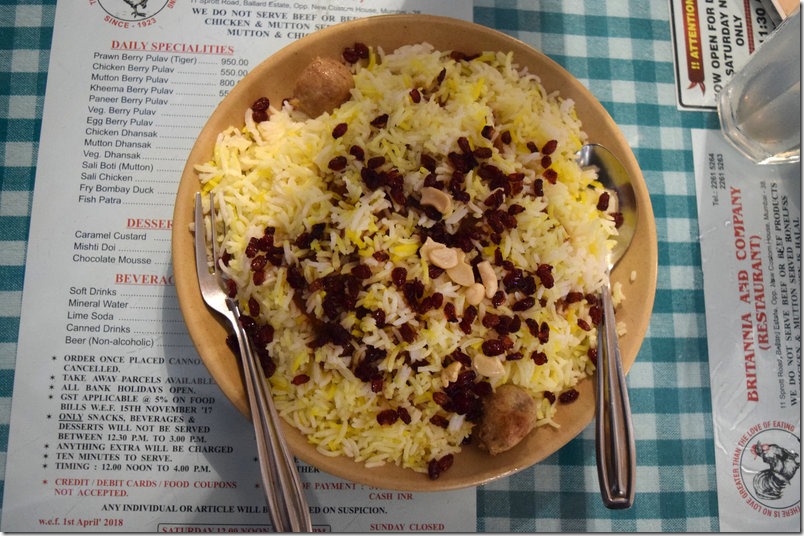Boman Kohinoor, 97, has spent the past eight decades committed to his beloved Britannia & Co., one of Mumbai’s last Parsi cafes. Here, he proudly holds up a photo of himself with two members of the British royal family: the Duke and Duchess of Cambridge, Prince William and the former Kate Middleton.
Article by Rebecca Rosman for NPR
The brown walls are peeling at all ends. Giant paint chips cake the ceiling. And the cash register — if you can call it that — is just a series of old wooden drawers.
“I’m going to put up a sign that says ‘Enter at your own risk.’ Otherwise someone is going to hold me liable,” says Romin Kohinoor, one of the owners of the nearly century-old Britannia & Co., one of Mumbai’s last Parsi cafes.
Luckily for Kohinoor, these quirky interiors have long been seen as more of an attraction than a liability.
Parsi cafes like Britannia & Co. started popping up around Mumbai in the late 19th century. They were founded by Parsis — Zoroastrians who fled religious persecution in their native Persia. The cafes became popular among many in India because, in a society where caste systems and long-standing taboos remain omnipresent, these cafes offered a place where various parts of Indian society mingled freely.
They are, in a word, cosmopolitan. They are also, in two words, dying out.
One of the world’s oldest religions, Zoroastrianism began thousands of years ago in what is now Iran, and the faith predates Islam. A central ethical tenet of the faith is to promote “good words, good thoughts and good deeds.” The Zoroastrian migrants brought to India not only their religious traditions but also their unique cuisine, offering a table to people of all classes, religions and ethnicities in an atmosphere scented with Iranian and Gujarati spices. Parsi cafes are emblems of tolerance, a core teaching of the Prophet Zoroaster, and their affordable food and snug tables attest to their place as servers of the common man.
At one point, there were around 400 Parsi cafes scattered across Mumbai. Today, there are less than 40.
A dwindling Parsi population, combined with little interest from newer generations to take over these family-owned businesses, means that there may not be any Parsi cafes in just a few decades.
But Britannia & Co. has a secret to standing strong amid a sea of dying neighbors: the 97-year-old owner, Boman Kohinoor, who has spent the past eight decades committed to his beloved cafe.
On one wall of Britannia & Co. is a portrait of Queen Elizabeth II. Next to her is a painting of Gandhi. Each serves as a reminder of the cafe’s unique cultural heritage.
Rebecca Rosman for NPR
“They say habit is second nature,” the bespectacled owner tells me over a generous plate of chicken berry pulao, the restaurant’s signature dish. “And habit has kept me coming here every day now for the last 80 years.”
Every day during the busy lunch hour, Kohinoor slowly makes his way around each table to partake in one of his favorite activities: schmoozing. Current favorite topics include the British monarchy, U.S. politics and his longevity plans. (He plans on breaking the Guinness World Record for oldest living person.)
India was still under British rule when Kohinoor’s father opened the cafe in 1923, which inspired the cafe’s name. “My father wanted to please the local commissioner, who was handing out leases at the time,” says Kohinoor.
When the restaurant opened, the menu consisted mostly of lighter European fare. It wasn’t until after independence from the British in 1947 that Kohinoor decided to revamp the menu, adding a slew of Iranian comfort food options that have since become the favorites here — dishes like sali boti, a lamb curry stewed with tomatoes, jaggery and onions and topped with fried potato strings.
Or the chicken berry pulao — moist chunks of chicken cooked in a fragrant tomato sauce, mixed with a rice pilaf and garnished with Iranian sour barberries. Downed with a fresh lime soda and crème caramel, it’s hard not to indulge.
Most items on the menu today follow the original recipes of Kohinoor’s late wife, Bacha — and they remain a fiercely guarded secret.
A small black-and-white photo of Bacha hangs on the wall alongside the restaurant’s entrance. On the other side of the room is a portrait of Queen Elizabeth II next to a painting of Gandhi. Several depictions of the Prophet Zoroaster, cloaked in white robes, are also on display. Each serves as a reminder of the cafe’s unique cultural heritage.
Chicken berry pulao is the signature dish at Britannia & Co.
Rebecca Rosman for NPR
Zoroastrians started arriving in India around 1,300 years ago to escape religious persecution from Arab invaders in their native Persia. By the mid-20th century, around 120,000 Parsis lived in India. Today there are less than half that. Zoroastrians don’t believe in conversion, making it hard to keep the religion alive.
But the more immediate problem for families like Kohinoor’s is a generational one.
Younger generations don’t want to inherit the long hours — and the risk of low returns — that come with running a restaurant.
“I’m only doing this for my dad,” admits Kohinoor’s 58-year-old son Romin, who has been working the register at Britannia & Co. for four decades. “He doesn’t want to close this place down. He doesn’t want to sell it at all.”
Romin has a 27-year-old daughter, Diana, who comes in at the end of each day to do the restaurant’s books.
She was studying law at university but didn’t really like it.
Now, “I would not want it to end because of me. So let’s take it forward,” she says.
But with her grandfather still going strong, her promotion from accountant to owner may be a while.

